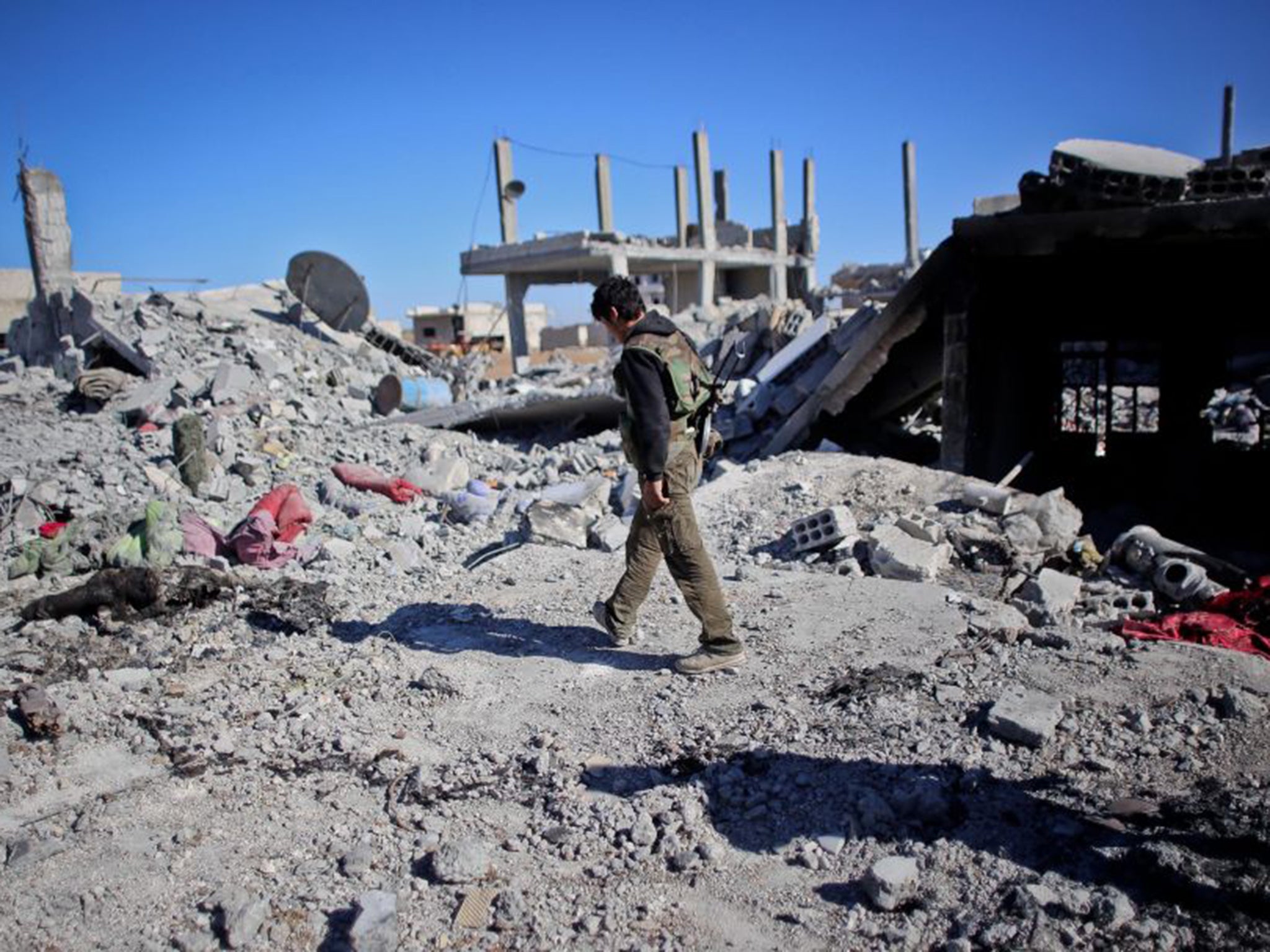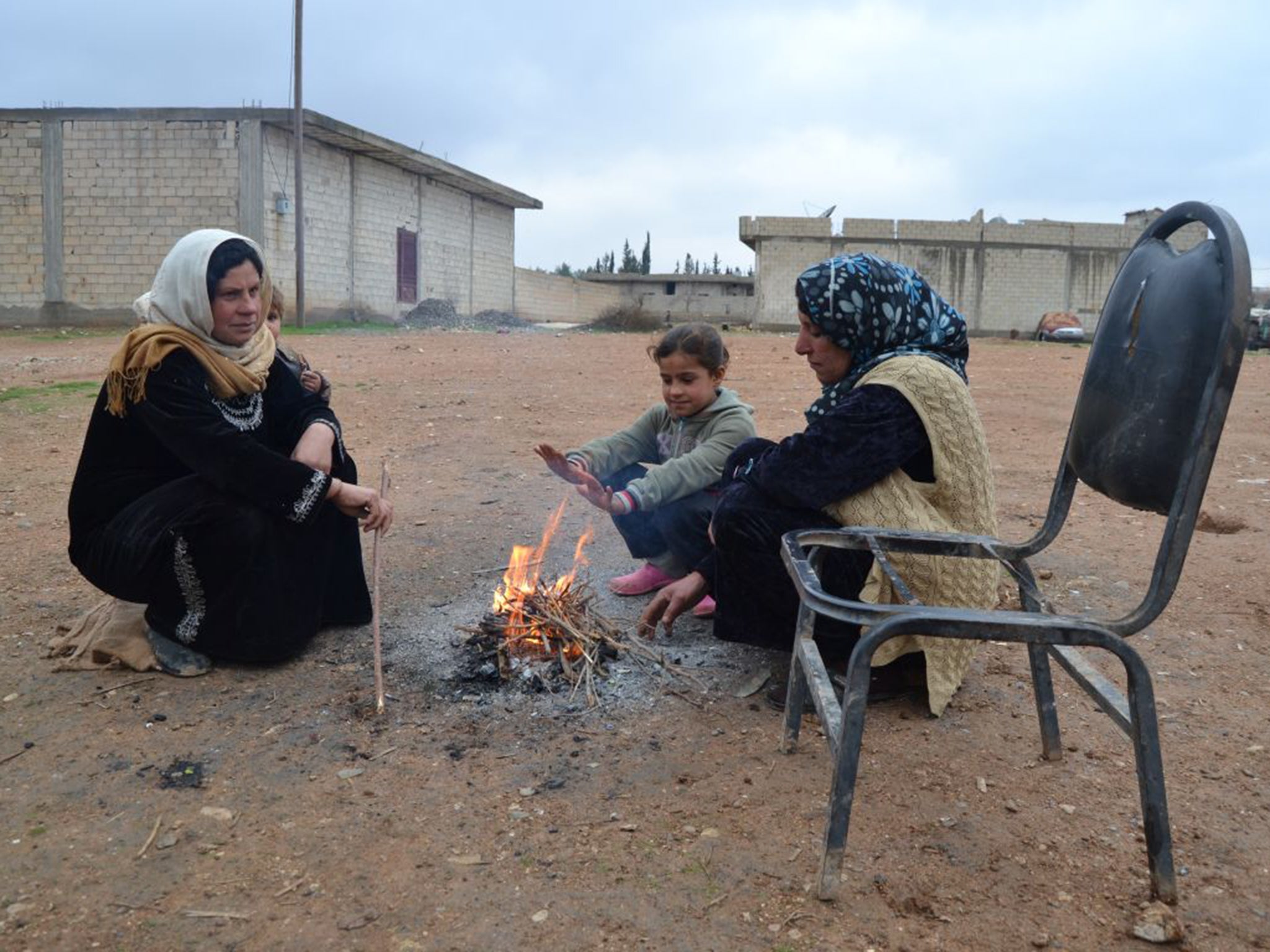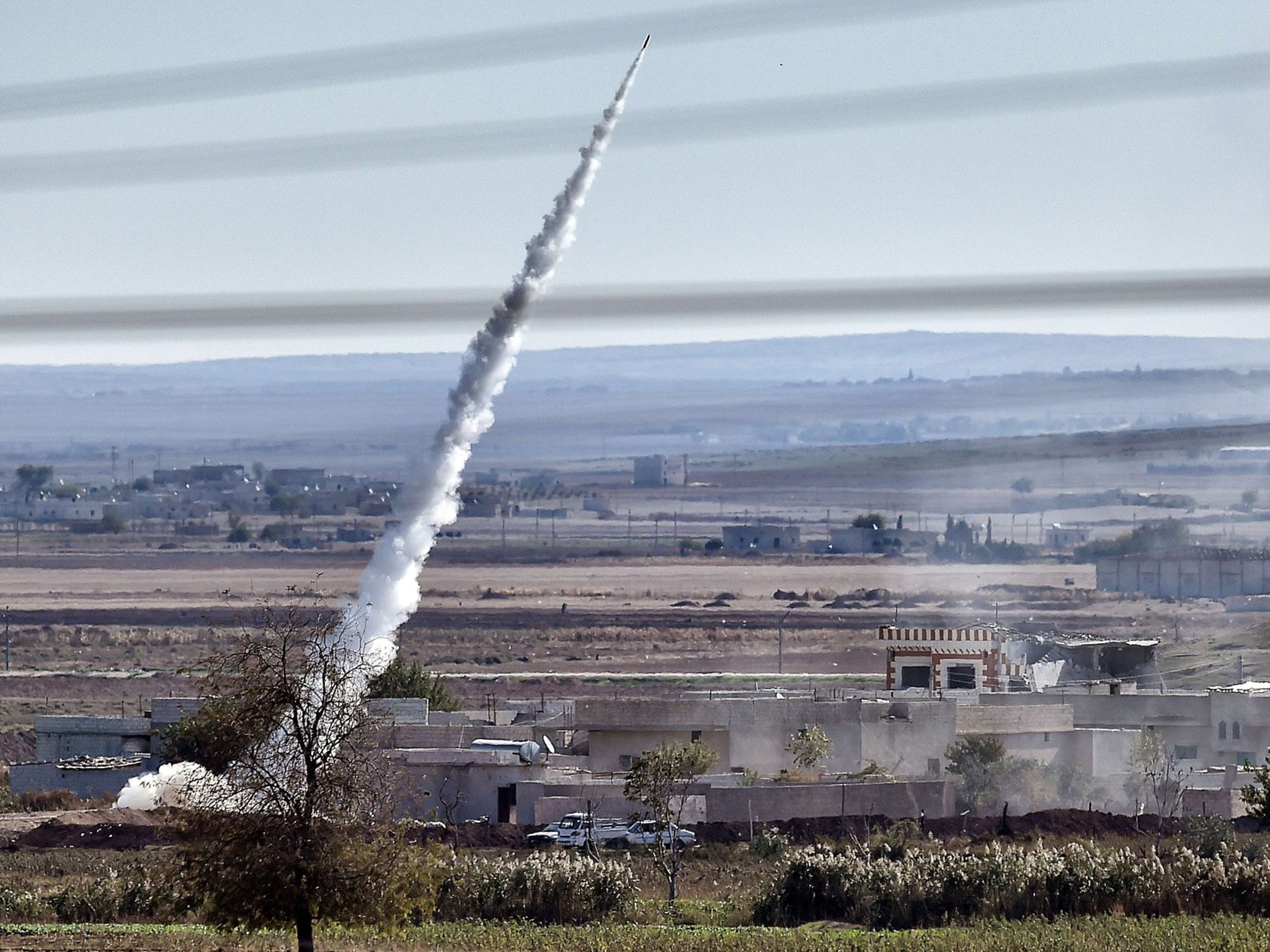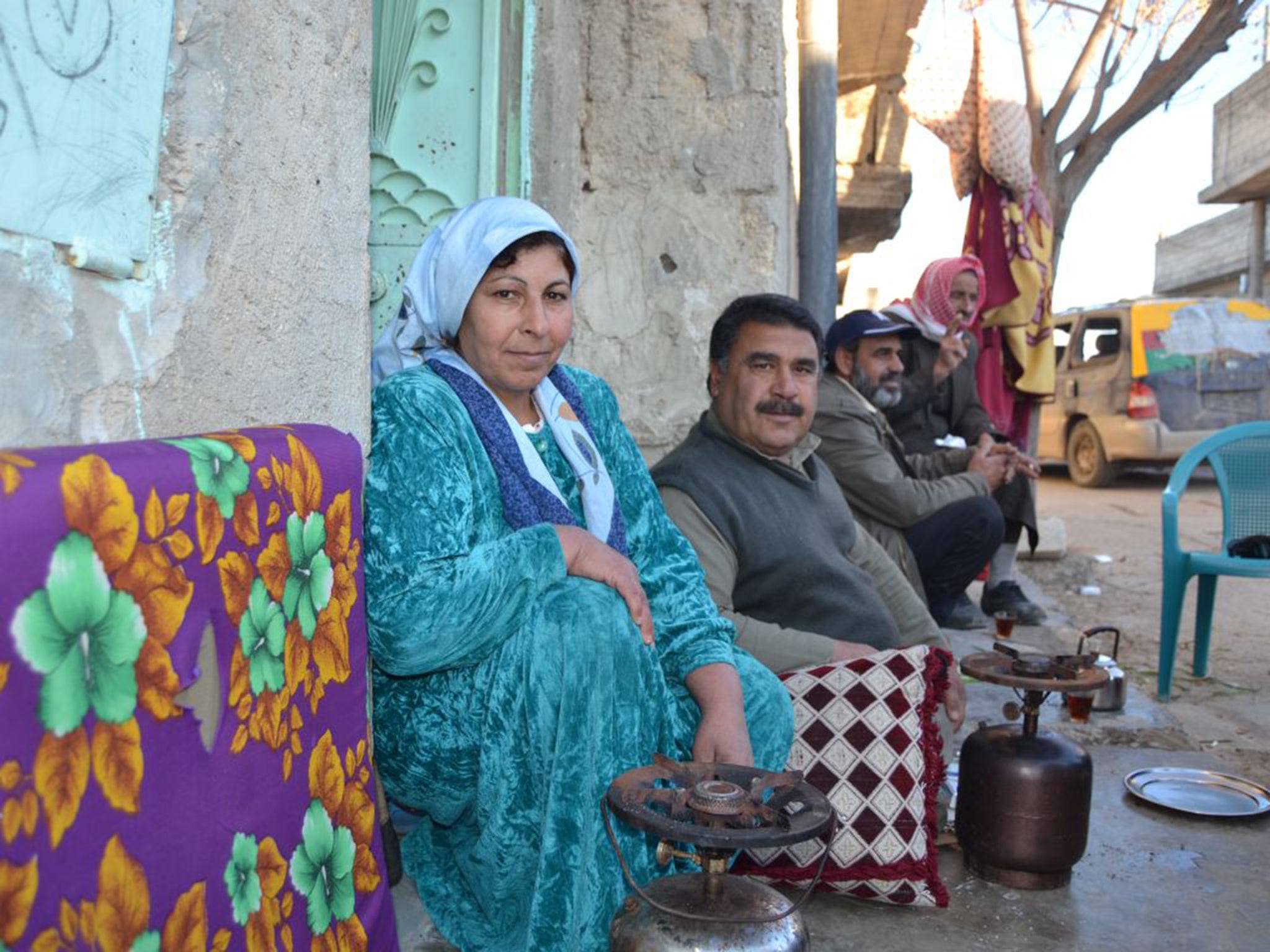War with Isis: The resilient people of Kobani are proof that the militants can be defeated
Their town may be destroyed but the residents' spirit is strong

Your support helps us to tell the story
From reproductive rights to climate change to Big Tech, The Independent is on the ground when the story is developing. Whether it's investigating the financials of Elon Musk's pro-Trump PAC or producing our latest documentary, 'The A Word', which shines a light on the American women fighting for reproductive rights, we know how important it is to parse out the facts from the messaging.
At such a critical moment in US history, we need reporters on the ground. Your donation allows us to keep sending journalists to speak to both sides of the story.
The Independent is trusted by Americans across the entire political spectrum. And unlike many other quality news outlets, we choose not to lock Americans out of our reporting and analysis with paywalls. We believe quality journalism should be available to everyone, paid for by those who can afford it.
Your support makes all the difference.Keeping the night watch at a border outpost at the edge of Kobani, one member of the Syrian Kurdish Democratic People's Units (YPG) stands surveying the surrounding area, despite the near total darkness of the city's wartime blackout. The triangular yellow flag of the YPG flutters on a small pole above him, a red star at its centre.
"Islamic State [also known as Isis] are over there," he says, pointing south-east, "less than a kilometre away." He adds that the first coalition air strikes came at a crucial moment.
"We only had one or two days left when they started bombing," he explains. "We were out of ammunition, everything."
Now, whenever an air strike lands, people happily shout "Obama!" and several newborn babies in Kobani have been named in honour of the American President.
Mortar strikes and gunfire can be heard throughout the day but, compared to the early days of the war, another border guard says: "Now is like peacetime. Back then, the shelling and the fighting didn't stop. No one slept for two weeks."
Before the US-led air strikes began in early October, the YPG had been battling Isis fighters in Kobani alone for 45 days. They were outgunned and outnumbered, and no one expected the town to survive.
"The bravery and courage of our forces stopped Isis," says Anwar Muslim, the Prime Minister of the canton of Kobani. "Then the coalition air strikes began and the [Iraqi Kurdish] Peshmerga also offered support, and our forces gained the initiative. Practically and psychologically, [Isis] are now broken."

The people of Kobani, on the other hand, are increasingly optimistic, buoyed by the recent steady success of the YPG. By mid-December, according to Kobani's Minister of Defence, Ismat Sheikh Hasan, Kurdish forces had retaken control of about 70 per cent of the town – although the frontlines are fluid and are shifting all the time.
"Planes hit the Isis positions inside Kobani and are also targeting the reinforcements they try to send here," he says. "But no matter how hard the fighter jets hit them, without an effective force on the ground, it wouldn't change anything."
The YPG still needs more heavy weapons, and more air strikes, particularly on Isis supply lines, Mr Hasan says, if Isis is to be defeated.
In recent days US-led coalition forces have launched dozens of air strikes over Kobani as part of their campaign against Isis across Syria and Iraq. Six strikes hit near the town yesterday, the Combined Joint Task Force said, while 17 strikes hit around Kobani on Thursday and Friday, as part of a round of 39 strikes across Iraq and Syria. Several Isis buildings, vehicles and fighting positions were said to have been destroyed.
"We are going to succeed," predicts Mr Muslim, "Isis can no longer control Kobani. We know we will win this battle but we need to be patient."
In the meantime, Kobani, once a small agricultural town on the Syrian-Turkish border, is now a wasteland. Entire areas have been reduced to rubble and the hundreds of civilians still living there are under constant threat.
On 16 December, an Isis mortar hit a house in the town killing Ahmed Abut and his 14-year-old son, Mustafa. The family had fled to Kobani from the nearby village of Bir Habash when IS first took the area this summer. Overwhelmed by the number of dead in recent months, funeral rites in Kobani are now kept to a minimum.
At a small local hospital, the body of the young boy is laid out and wrapped in white cloth before being placed in a black plastic body bag and transferred to a flimsy plywood coffin. His father's body waits on a large metal tray on the floor.
The coffins are placed in the back of a truck and taken to a nearby patch of land where two long trenches have already been dug, ready for the coffins that arrive every day.

Mustafa's mother and sister sit nearby, sobbing as YPG fighters lower the coffins into the ground and cover them with earth. A Peshmerga soldier places a jagged white headstone on the mound, watched by a few old men in long white robes, with red Kurdish turbans tied around their heads.
"He was a poor man. He planned to go back to his village when it was liberated," one of Abut's neighbours says, as the small group of mourners breaks up and heads home. "He was a good man; we used to help each other."
As well as the threat to their lives, Kobani's remaining residents face increasingly difficult conditions as winter sets in and temperatures plummet.
On a chilly December afternoon, 30-year-old Letfiya Aberkali Zelema is huddled around a small campfire outside her home in western Kobani. "We have no heat and no fuel," she explains. "We have to make fires outside and cook here."
While thousands of others fled across the border to Turkey when the fighting started, Ms Zelema's family decided to stay. "This is our land. Why should we leave it for others? It's better to die here," she says.
Although there are no shops left in the town, the local municipality, run by the Syrian-Kurdish Democratic Union Party, organises regular distributions of basic supplies to residents, including food, clothes and medicine. Even rubbish collection continues, the dustbin man tossing bags into the back of a small truck, shovel in one hand and a rifle strapped to his back.
Ms Zelema says her five children, who range in age from 18 months to 12 years old, are afraid. "We try to tell them everything is fine but if there's a mortar shell they get scared." Outside, the children are running around a large patch of open ground in front of the house, laughing and taking turns on a small bicycle, occasionally coming back to the fire to warm up.
While she spends her days taking care of her family, most civilians are actively participating in the war effort. "We were given military and ideological training," says Asia, a young woman who joined the Women's Protection Unit three months ago. "The ideological training is just as important. You can't fight if you don't know what you're fighting for."

Ahmed Ismael, a 22-year-old carpenter, joined the resistance four months ago. "It's been three years that our people – even small children – know how to fight," he says. "Everyone has learned how to use a weapon."
Based in a small house in the now destroyed market area of Kobani, Ismael helps provide support to the frontline, bringing food and ammunition to fighters, or transporting injured soldiers to hospital.
Members of the local resistance have knocked holes in the walls between the terraced houses so they can cross the town under safe cover. Curtains are hung across the entrance of some streets to protect people from Isis snipers.
"We are fighting for our freedom," he says. "We are fighting so that our lives can go back to normal."
Mahmoud Salih, 50, and his wife Khadija Yusef, 40, also stayed behind. They tried to flee to Turkey when the fighting started, but soon turned around.
"I told my wife to go to Turkey where she would be safe," Mahmoud says. "But she said, 'I'll stay with you; if you die, I'll die with you. Isis has already destroyed too many lives.' It's difficult but we are coping. Kobani might be a small town but we have a big heart."
These days it also has a fierce and hard-won pride. "People said we will fight, and many became refugees," Mr Muslim says, "but we refused to live with Isis and its ideology. We showed that if people fight and resist, Isis can be defeated."
Subscribe to Independent Premium to bookmark this article
Want to bookmark your favourite articles and stories to read or reference later? Start your Independent Premium subscription today.
Join our commenting forum
Join thought-provoking conversations, follow other Independent readers and see their replies
Comments